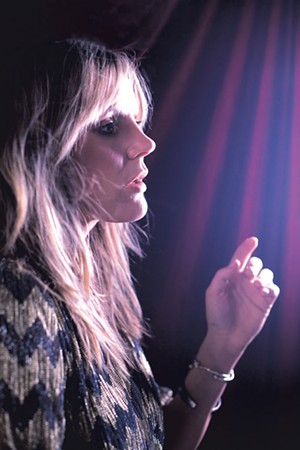
- Courtesy Of Pamela Neal
- Grace Potter
Not so long ago, Grace Potter thought she was done with music. Throughout the 2000s and early 2010s, the Vermont-born rocker, with the aid of her longtime band the Nocturnals, saw her popularity skyrocket. She nabbed the attention of rock-and-roll legends such as the Rolling Stones and Jackson Browne and had built an enthusiastic international fan base.
But in 2015 she dissolved the Nocturnals and released her debut solo album, Midnight. A somewhat awkward transition from front person to solo artist left Potter lost. As she puts it in an essay she wrote about her recently released new album, Daylight, "There was so much hurt connected to my musical past that I didn't know how to embark on a new musical future."
As anyone who's endured an existential crisis might say, sometimes the only way out is through. During the transition from Midnight to Daylight, both produced by her husband Eric Valentine, she had a reawakening. All it took was time away to grow, think and, as Potter tells Seven Days, get out of her head.
Another reason for the four-year gap in record releases: In 2017, Potter revealed to the crowd at Grand Point North, her annual music festival at Burlington's Waterfront Park, that she would soon be a mom. Her son, Sagan, was born the following year.
Now living in California, Potter, 36, returns to Vermont on Saturday, November 30, to play a free show as part of the 2019 HomeLight Killington Cup at Killington Resort. Seven Days caught up with her by phone.
SEVEN DAYS: I understand that you went through a period of falling out of love with music. When you felt the most disconnected from that part of your life, what did you imagine you'd do instead?
GRACE POTTER: I'm really excited about house renovations — which is actually a pretty lucrative career that I had been pursuing in Vermont. I kind of figured I would make music, but I would fix up houses, too. I specialized in restoring historic properties, and there are a lot of them in Vermont. Coming out to California, it was really amazing because there's all this new construction. I was like, "These places are in great shape. I could fix these up in a minute."
Granted, I think it's probably a little less lucrative than I was imagining. I got into it a little bit here. I was doing lots of house painting and demolition and landscaping — getting my hands dirty, the way I used to. And it felt so good to be useful and use my hands for my work again, in a very different way. I found it incredibly rewarding. This was before I had the baby. It wasn't even about that. I just wanted to go do something — anything — that was the opposite of what I had been doing. Music really came back in through that process.
SD: The process of recording and producing Daylight was a bit different from past albums. Specifically, you recorded it as a live band in the studio. How does that process come through in the final product?
GP: For me, it's the performance. For Eric, he's exploring sounds and really wanting to capture what I refer to as a "bloody performance," which means there's a lot of bleed from the drums to the guitars to the bass guitar to my vocals. You can hear all of us playing in the room, because it was bleeding. There's a little, tiny bit of separation, but not much.
For me, I could feel the energy of the band. My performances just naturally had momentum. I would think, I can't screw this up because they're all here giving their best. And that energy feeds and grows and becomes much more general for me. When I'm in the vocal booth banging out take after take, you get in your own head. It feels like brain surgery. Whereas, being in the studio live, every moment matters, and everybody's time matters.
SD: Jess Wolfe and Holly Laessig of Lucius appear five times throughout Daylight. How did that relationship form?
GP: They opened for the Nocturnals and me in Chicago. Jeff Tweedy was really excited about them, and he had reached out to my management to say we should be in each other's presence at some point on this tour. It was a long time ago, but I never forgot their performance and their energy.
The next year, we booked them at Grand Point North. This would have been 2014. They came and sang "With A Little Help From My Friends" during the big encore moment that we usually have. It was the most incredible sound with my voice that I'd ever heard. They don't just blend with one another. The timbre of our three voices was so incredible and bone chilling. Now we're just friends. We're the same kind of people.
SD: Speaking of Wolfe and Laessig, they join you on "Desire." That's a party of a song if I've ever heard one! What's it all about?
GP: The part of me that I've always masked is the part of me that really came out of making Midnight. I refer to it as my flare-up. All of this sort of subdued rocker energy that we had really been honing in on with the Nocturnals at the time, it wasn't the whole me. I think Midnight was the reaction to that, the side of me that has this yearning, uncontrollable sensuality. It's like maple syrup that you pour over everything.
Sometimes I could express that in the Nocturnals era, and sometimes I felt like I needed to rein it in. "Desire" is an expression for me of who I really am and how I consume life and experiences that I look forward to. The things that I love about being human are sometimes when you just have no control. You can't think your way out of a situation. You basically have to dance, or fuck, or slap somebody in the face, or laugh uncontrollably until you're rolling around on the floor crying. That's the maximalist me that's never really been able to come out before. Instead of masking it in lyrical trickery, I figured, Why not just say it?
SD: You've got a pretty intense tour scheduled for early 2020. Will you bring Sagan with you?
GP: Yeah. That's my rule. The kid comes with, otherwise it's not happening. We have to accommodate the change of who I am as a human beyond just missing him if I were gone. I also see him as inspiration. The whole reason I got back into music is because I want him to think I'm cool. That's at the heart of it. And it makes it much easier for me if I think about what a tour's gonna be like. We can make a home of it. I think it'll change when he's in school. But for now, home is where we all are.
SD: Do you find any similarities between your new home of Topanga Canyon and where you grew up?
GP: One hundred percent. It is Warren, Vt. I send photos home, and people think it's Vermont. I grew up with hippie parents who wanted to run away. The baby boomer culture was like, "Fuck you, Mom and Dad, and everything you're providing for us." All that energy is here.
This interview has been edited and condensed for clarity and length.











Comments
Comments are closed.
From 2014-2020, Seven Days allowed readers to comment on all stories posted on our website. While we've appreciated the suggestions and insights, right now Seven Days is prioritizing our core mission — producing high-quality, responsible local journalism — over moderating online debates between readers.
To criticize, correct or praise our reporting, please send us a letter to the editor or send us a tip. We’ll check it out and report the results.
Online comments may return when we have better tech tools for managing them. Thanks for reading.